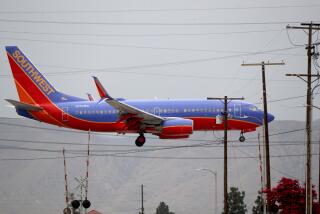Consumer Report : Airline Grade Cards Are Improved
- Share via
It’s official: Our nation’s airlines have been doing a better job of meeting schedules and generally pleasing their customers.
The Department of Transportation airline performance report for 1988 shows improvement by the industry as a whole in timekeeping (an arrival within 15 minutes of schedule is considered on time), along with a marked decline in passenger complaints lodged.
In 1987, 44,857 consumers complained about the airlines, according to the DOT. In 1988, that number dropped to 23,844, a reduction of 47%.
It could be argued that the traveling public is getting more tolerant. Or sympathetic. Or resigned to the seeming inevitability of hassles and snafus.
But I doubt it.
Less Tolerant
On the contrary, the public is getting less, not more, tolerant. Never have travelers been more aware of their rights or more strident in calling on the carriers to shape up.
Clearly, a less-demanding clientele is not the reason that the number of complaints is declining. The airlines really are managing to do a better job of serving their customers.
Continental is a good example. The Houston-based carrier was an industry leader of long standing in the number of times its passengers hollered “foul” about delays, lost baggage and shoddy flight service.
In 1987 Continental’s file in the DOT bulged with more than 26 complaining letters for every 100,000 passengers carried. In 1988 that number fell to just under 12 per 100,000.
In December the ratio of gripes against Continental dropped to a shade more than three letters per 100,000 passengers.
That improvement, which the company promised a year ago, lifted Continental into a respectable position near the top of the 18 carriers covered by the report.
The DOT’s log on Northwest shows the complaint ratio dropping to just more than six letters, and to fewer than two in December, down from 18 in 1987.
Coping With Mergers
It is no coincidence that Continental and Northwest were involved in mergers in the early part of the year. Their struggle to integrate acquisitions into their systems almost certainly contributed to their poor showing.
At about that time Continental was involved in assimilating People Express and Frontier. Minneapolis-based Northwest took over Republic and faced the same problems of maintaining passenger service standards while trying to satisfy the needs and concerns of employees with different seniority tables, different pay scales and different methods.
The industry’s December figures are perhaps the most encouraging aspect of the DOT report. It’s not normally a month in which the airlines expect to distinguish themselves, due to factors such as inclement weather and heavy holiday traffic.
On-time performance becomes almost impossible to maintain, and customers’ demands tend to become extreme.
To wit: At Los Angeles International Airport a couple of days before Christmas, while waiting to meet my son coming home from school, I watched a woman at an American Airlines gate insist that she had been assured she would be permitted to take on board the package she was carrying.
The package must have been at least six feet high, maybe a foot deep and two feet across, maybe the biggest present I’ve ever seen. Believe it or not, it was gift-wrapped and had a large bow on the front.
What it needed was a place in the luggage compartment. But the woman would have none of that. It was fragile; the wrapping would get soiled and torn, and the bow lost.
The woman spent 10 minutes (while others waited in line) arguing with the counter agent that the thing--whatever it was--simply had to go with her into the passenger compartment.
Common sense should have told her there simply was no place other than the luggage bay that this object could be stored.
Heavy Pressure
Her demand was unreasonable, and was made at a time when the volume of passenger traffic was high, with airline employees under heavier pressure than usual. It was the kind of situation out of which complaints arise.
You might consider it bad news that Pan Am (with four complaints per 100,000 customers) and TWA (with three) were the worst on the list in December. In fact, it’s kind of good news; in the same month of 1987 complaints against those two were three times higher.
In schedule keeping, the on-time average ran at better than 70% over the year. Final December figures are not yet known, and will reflect weather-related delays. But there is a trend toward improvement within the industry that not even the winter snows will reverse.
Three airlines, Southwest (86.1%), America West (85.7%) and American (83.3%), have maintained a better than 80% on-time standard since the DOT started keeping these statistics 14 months ago.
Much remains to be done. Airline service is not yet up to a standard with which anybody can feel totally comfortable.
The difference, it seems, is that since consumers started making their feelings known, and since Congress started making noises about re-regulating the industry, the airlines are beginning to do something about it.
More to Read
Inside the business of entertainment
The Wide Shot brings you news, analysis and insights on everything from streaming wars to production — and what it all means for the future.
You may occasionally receive promotional content from the Los Angeles Times.










